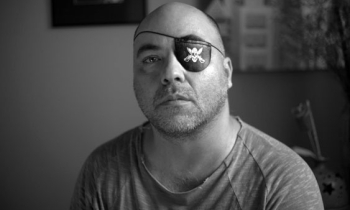M ubarak Defends Freedom of Opinion and Expression! A Victory for Freedom of the Press! The Press Decides the First Round — and The Fight Will Continue! Mubarak Delivers on his Promise and Sides with Freedom of the Press and Democracy!
So screamed most Egyptian newspapers — state-owned, independent and opposition alike — a day after the People’s Assembly passed amendments to the criminal code eliminating jail sentences for journalists found guilty of libel.
In the weeks running up to the final vote, members of the press and civil rights activists were up in arms as clauses mandating jail terms for journalists charged for alleged “publishing offenses” remained part of the proposed legislation.
President Mubarak had announced his intention to abolish prison terms for such offenses in February 2004, and had repeated the promise during last fall’s presidential election campaign after more than a year of parliamentary inaction.
On July 9, the day before the text of the amendments was debated in Parliament, 25 independent and opposition newspapers refused to print their regularly scheduled issues. As debate began the following day, journalists demonstrated outside the People’s Assembly. The heated exchanges between members of the governing National Democratic Party (NDP) and the opposition in Parliament and many of the protests of the press were quelled only when Mubarak stepped in to suggest scrapping prison terms for libel altogether.
The amendments abolish four articles imposing prison terms for libeling public officials or parliamentarians, while at the same time doubling fines for those offenses to a new maximum of LE 20,000. Under the new legislation, however, journalists still face imprisonment if they are found guilty of “inciting discrimination or hatred” against minority groups, identified by their sex, race, language or religion, in a manner that threatens “public order.” Prison terms may also be imposed on anyone who publishes or broadcasts material that contradicts “public modesty and morals.”
Disseminating false material that “undermines the nation’s reputation” could also incur a penalty of LE 10,000 to LE 30,000.
“I am shocked that many of my colleagues have been so joyful about it,’” says Hassan Ragab, a former Al-Akhbar journalist and a professor of media laws and ethics at the American University in Cairo. “They just took out the jail term, but it’s still there if you fail to pay the fine.”
Anyone failing to pay court-imposed fines is still subject to terms in prison under the country’s criminal code.
As Ibrahim Eissa, the editor-in-chief of El-Destour and Sawt El-Umma, two of the nation’s most controversial independent weeklies, points out, “The doubling of the fines can lead to prison. Most journalists who are accused [of libel] collect salaries between LE 350 and LE 500. How would they pay the fines?”
“Journalists should not be jailed under any circumstances in a democratic country. What has changed now in this respect? Nothing: We are still liable to go to jail at any time,” says Ragab.
Although journalists are sometimes jailed in the West for offenses stemming from their work — as was former New York Times reporter Judy Miller last year — it is a rare occurrence. Prison terms are generally reserved for journalists who defy court orders to divulge their sources, and libel is usually treated as a civil offense involving fines and restitution, not as a criminal matter.
According to Negad El-Boraai, Secretary-General of the Society to Promote Democracy, a local non-governmental organization, there are still some 19 articles in the penal code that makes journalists liable to terms in prison for publishing materials that “‘threaten the stability’ of the country or ‘stir up chaos,’ among other offenses.”
Journalists face sentences as long as 15 years if convicted of publishing news or opinion columns that “weaken the nation in a time of war,” adds El-Boraai, who is an attorney for several national publications.
In July, Eissa and an El-Destour reporter were slapped with one-year jail terms and fines of LE 10,000 each for “humiliating the president” by reporting a citizen’s complaint accusing Mubarak of corruption.
Eissa maintains that the sentence was politically motivated and meant to “terrorize” him into silence. The suit was filed in Warak Misdemeanor Court (a division of the North Giza Court, not a criminal court as has been reported elsewhere) not by the Presidency, let alone Mubarak personally, but by a “group of concerned citizens.”
“We do not write anything unless we strongly believe it conforms with the law,” says Eissa. “We respect the law and there was no humiliation of the president. We hold debates with the president, criticize him, oppose him and attack him politically. All this happens within the parameters of democracy. [There isn’t a single] developed and respectable country where the president’s actions, policies and decisions are not criticized.”
El-Destour took the nation by surprise when it hit newsstands in its most recent incarnation in early 2005, quickly winning a loyal readership with unprecedentedly blunt criticism of the president and his family. For many Egyptians, Eissa’s weekly satirical column is a must read.
“I was expecting a disaster to happen. I expected the closure of the newspaper, but I did not expect a jail sentence,” says Eissa, whose newspaper was shuttered by the courts in the 1990s for having run a story claiming to have uncovered a plot by extremists to assassinate prominent Coptic business leaders.
Eissa is presently free on bail pending appeal. In documents filed with the court, Eissa’s attorney claims the case should be thrown out because the plaintiffs have no legal standing to file the appeal, arguing in essence that only the president or someone acting at his direct behest should be able to sue Eissa. Hearings on his petition are set to begin in October.
“Legally speaking, I feel comfortable because my position is clear,” Eissa says. The editor-in-chief notes that not only does the plaintiff not have standing in the case, but also that, “I did not humiliate the president at all. We published a news story about a case that was before the courts and this piece of news was 100 percent true.”
Eissa’s case came just days after three prominent journalists were ordered to stand trial in Cairo Felony Court on charges they libeled the judiciary by publishing a leaked list of judges accused of vote rigging during last fall’s parliamentary elections.
The trial, which opened in June and promptly recessed, is slated to resume on September 16, 2006.
Foreign reactions
The Committee to Protect Journalists (CPJ), based in the United States, has also voiced concerns over the amendments, maintaining that they fell short of honoring Mubarak’s promise to eliminate jail terms for publishing offenses, according to a statement posted on the organization’s website on July 12, 2006.
“Egyptian journalists are hardly better off today than they were before this law,” wrote CPJ Executive Director Joel Simon. “Journalists can still be locked up for what they write, and now they are subject to more onerous fines that can be used to silence them.”
According to Michael Fowler, a leading international media lawyer who has worked as a journalist with outlets including the Associated Press and the Miami Herald, jail sentences are an “improper penalty” for journalists.
“[American] courts have called it a ‘disproportionate penalty’ — with a prison term outweighing any ill effects of defamation or insult,” he explains. “It is disproportionate to the offense and causes self-censorship — that is, reporters and commentators avoid reporting and commenting on things the people should know because they are afraid to go to prison.”
To Fowler, outsized fines can have a similarly crushing effect. “Any fine that is stiff enough to discourage journalists from reporting and commentators from commenting has a ‘chilling effect’ on free speech,” says Fowler. “Requiring journalists to compensate people for damage caused by malicious falsity is acceptable; anything beyond that has the potential of causing self-censorship. That is especially so if the country jails people who can’t pay their debts — another practice that falls below international standards.”
New penalties
The newly passed bill contained several new articles that stirred serious opposition in the media. One imposed both a prison penalty and fine (ranging from LE 15,000 to LE 30,000) on journalists who question the financial propriety of public officials. Critics allege the article was included at the behest of steel magnate Ahmed Ezz, who heads the NDP’s Organization Secretariat and is a prominent member of the wing of Young Turks in the party led by Gamal Mubarak.
Over the past four years, Ezz has been the subject of exhaustive attacks in media outlets alleging he has won a monopoly over the steel industry. A fall 2004 report by the Central Auditing Organization, the national anti-corruption watchdog that reports to the Presidency and the People’s Assembly, cleared Ezz of any wrongdoing but failed to quash public complaints.
Late last month, Minister of Trade and Industry Rachid Mohamed Rachid ordered the new Anti-Monopoly and Fair Competition Authority to launch a sweeping investigation into the steel industry in a bid to settle the charges of price-fixing and market-making once and for all.
Ragab and others are also incensed that the law creates the new offense of “libeling foreign leaders,” which would see anyone who attacks a foreign head of state subject to fines of LE 10,000 to LE 20,000 or a term in prison of up to 24 months.
“If I criticize President Bush in the US, I will not be punished; but if I criticize him in Egypt, I will be punished. It is disastrous,” laughs Ragab.
Getting the facts
As problematic as the penal code may be, it’s not the only legal hurdle journalists face today, says El-Boraai.
“The penal code does not represent the real problem of the press — saying so is taking a narrow-minded view,” he says. “Of the 100 cases [against journalists] that this office has handled, only one or two ended up with sentences that imposed prison terms — and those were subsequently overturned.
“The problem lies in the right to get the information. This right is still restricted. How can you hold the journalist accountable for what he published if he does not have the information?” wonders El-Boraai.
Egyptian law is similar in many respects to the British libel code, placing the burden of proof squarely on the journalist, not the plaintiff. While British or Egyptian reporters must prove that what they wrote is entirely true, in the US the plaintiff must prove the report was false.
“As a journalist, you write relying on your guesses, rumors or anonymous sources. Ultimately, you get into trouble,” states El-Boraai, who says Egypt needs to adopt the same freedom-of-information system that other democracies have put in place to give journalists the right to demand the government disclose information in the public’s interest.
“The law hampers access to information because you can’t get it without a government permit. Also, the law does not specify a mechanism whereby you can complain about the inaccessibility of information.”
Yehia Qelash, secretary-general of the Journalists’ Syndicate, agrees with El-Boraai, explaining that pushing for a law that guarantees the free flow of information is among the top priorities of his syndicate.
At the same time, Qelash hailed last month’s amendments as an achievement of sorts. “We do not want to underplay what we achieved,” says Qelash. “I believe we made a gain by setting a precedent of abolishing prison terms for some press offenses.”
He notes another positive outcome of the recent legislation: the instatement of the principle of “presumption of good faith” in libel cases. “This is a very important matter because in the old law, it was almost non-existent,” Qelash says.
Previously, journalists could be jailed for reporting the truth if the trial judge agreed with the plaintiff that the reporter had done so with malicious intent — meaning truth was not an absolute defense against libel in cases involving public figures.
Saying the Syndicate will continue lobbying for the repeal of all legislation it deems ‘restrictive of freedom of the press,’ Qelash says, “if we see this as a war, we can say that we won a battle, but we have not won the war. Not yet.”









